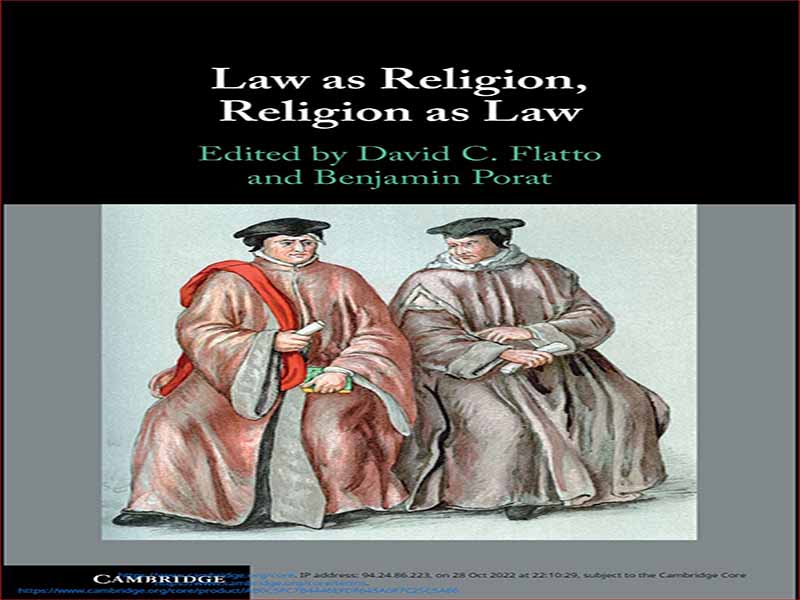- عنوان کتاب: law as religion, religion as law
- نویسنده: David-C.-Flatto
- حوزه: حکومت دینی
- سال انتشار: 2022
- تعداد صفحه: 404
- زبان اصلی: انگلیسی
- نوع فایل: pdf
- حجم فایل: 4.81 مگابایت
رویکرد مرسوم برای ارزیابی رابطه بین قانون و دین بر این فرض عمل میکند که اینها حوزههای گسستهای هستند که اغلب با یکدیگر رقابت میکنند، و حتی گاهی در تضاد هستند. این جهتگیری، پژوهش و گفتمان عمومی را در مورد موضوعات برجستهای مانند میانجیگری بین کلیسا و دولت زنده میکند. ایجاد تعادل بین آزادی مذهب و آزادی از مذهب. سنجیدن تعهدات متناوب دین و حقوق بشر؛ و تعیین حدود صلاحیت های مربوطه دادگاه های مدنی و مذهبی. با این حال، یک پارادایم دوگانه تنها راه برای مفهوم سازی تقاطع بین قانون و دین نیست. جلد «قانون به مثابه دین، دین به مثابه قانون» دیدگاه متفاوتی را بررسی میکند که در پژوهشهای اخیر پدیدار شده است که قانون و دین را چارچوبهای همپوشانی میدانند که زندگی افراد و همچنین نظم اجتماعی را ساختار میدهند. از این نقطه نظر، مسلماً قانون و دین دارای ویژگیهای مشابهی هستند و حتی ممکن است رابطه همزیستی داشته باشند. علاوه بر این، بسیاری از نظامهای حقوقی ویژگیهای دینی را نشان میدهند و مفاهیم خود را از اقتدار، سابقه، متون آیینی و شرعی بیان میکنند و بیشتر ادیان به مفاهیم یا اصطلاحات حقوقی استناد میکنند (این پدیده بهویژه در سنتهای هنجاری غلیظ ادیان ابراهیمی مشهود است). این تار شدن وسوسهانگیز مقولهها، فصلهای گستردهای را که این جلد را تشکیل میدهند، فرا میگیرد. با بررسی ارتباطات متقابل متعدد بین دین و قانون، فصول جلد «قانون به مثابه دین، دین به مثابه قانون» در چندین گفتمان تأثیرگذار که در آکادمی و میدان عمومی در حال انجام است، مشارکت میکنند و به آنها کمک میکنند. یکی افزایش علاقه به الهیات سیاسی است، روشی از تحقیق که نظریه سیاسی لیبرال سکولار را نقد میکند و معتقد است که برخی از قدرتها و اصول حاکمیت مدرن از نهادها یا دکترینهای الهیاتی ناشی میشوند یا جایگزین آنها میشوند. مطالعات اخیر پل کان، مارک لیلا و سیلا بنهابیب این ادعا را در حوزه سیاسی ارزیابی کرده اند، و هارولد برمن، استیون اسمیت و جرمی والدرون بر موضوعات مشابه در حوزه حقوقی تمرکز کرده اند.2 در مقاله ای انتقادی به بررسی این روند رو به رشد سیسیل لابورد قانعکنندهای استدلال میکند که الهیات سیاسی مفسران را مجبور میکند بیشتر درباره مقوله دین فکر کنند.3 این جلد شامل مطالعات نافذی است که با ارزیابی مجدد پیوند بین دین، قانون و سیاست از دیدگاههای متعددی که عمق جدیدی میبخشد، به این دعوت احترام میگذارد. به این پرس و جو دومین گفتمان علمی مرتبط درباره سکولاریسم، روایت وبری از مدرنیته را به عنوان دوره ای از افسون فزاینده به چالش کشیده است. در واقع، تحولات سیاسی و تجربی دهههای گذشته، پیشبینیهای دیرینه درباره زوال دین را بیثبات کرده است. محققان با استفاده از لنزهای انسانشناسی، فلسفه، جامعهشناسی و تاریخ، شیوهای را در نظر گرفتهاند که در آن سکولاریسم خود مقولهای ساختهشده است (مثلاً به آثار اسد، تیلور، برگر، کاوانا و همچنین مطالعات جدیدتر مراجعه کنید. از Copson and Crane).4 این جلد با بازبینی و پیچیدهتر کردن مقولههای «قانون» و «دین» و مفاهیم احتمالی آنها در «عصر سکولار» از طیف گستردهای از رشتهها، بافت انتقادی را به این استدلالها اضافه میکند. سومین گفتمان مربوط به رویکردهای معاصر به کلیسا و دولت است. برخی از محققین انتقادات شدیدی از پارادایم های سنتی ارائه کرده اند (لابورد، شاکمن هرد، محمود)5 یا خواهان تجدید نظرهای مهم در آموزه های دولت-کلیسا شده اند (ایسگروبر و ساگر، گرینوالت). ، اما این همچنین نگرانی هایی را در مورد چالش های اجتماعی آزاردهنده ای برانگیخته است که این امر باعث تسریع آن می شود. برای مثال، مایکل ایگناتیف در مورد اینکه آیا سیاستهای لیبرال میتوانند راههایی برای تطبیق سنتهای حقوقی دینی در نظم هنجاری بزرگتر بیابند یا خیر ابراز تردید کرده است.7 بدون در نظر گرفتن موانع بزرگی که ممکن است با آن مواجه شویم، چنین پاسخی مستلزم تعاریف محدود یا سفت و سختی از قانون و دین است. . بنابراین، مطالعات این جلد تغییرات قابل توجهی را پیشنهاد می کند که در این زمینه قابل تامل است.
The conventional approach to evaluating the relationship between law and religion operates on the assumption that these are discrete domains that often compete, and at times even clash, with one another. This orientation animates scholarship and public discourse on such salient topics as mediating between church and state; balancing freedom of religion and freedom from religion; weighing the alternate commitments of religion and human rights; and delimiting the respective jurisdictions of civil and religious courts. A dichotomous paradigm, however, is not the only way to conceptualize the intersection between law and religion. The “Law As Religion, Religion As Law” volume explores a different perspective that has emerged in recent scholarship which regards law and religion as overlapping frameworks that structure the lives of individuals as well as the social order. From this vantage point, law and religion arguably share similar properties, and may even have a symbiotic relationship. Moreover, many legal systems exhibit religious characteristics, informing their notions of authority, precedent, ritual and canonical texts, and most religions invoke legal concepts or terminology (this phenomenon is especially evident in the thick normative traditions of the Abrahamic religions). This suggestive blurring of categories pervades the wide-ranging chapters that comprise this volume. By exploring manifold interconnections between religion and law, the chapters of the “Law As Religion, Religion As Law” volume participate in, and contribute to, several influential discourses that are ongoing in the academy and the public square. One is the surge of interest in political theology, a mode of inquiry that critiques secular liberal political theory and posits that certain modern sovereign powers and principles derive from, or replace, theological institutions or doctrines. Recent studies by Paul Kahn, Mark Lilla, and Seyla Benhabib have evaluated this claim in the political domain,1 and Harold Berman, Steven Smith, and Jeremy Waldron have focused on analogous themes in the legal sphere.2 In a critical essay surveying this growing field, Cecile Laborde argues persuasively that political theology forces commentators to think harder about the category of religion.3 This volume contains penetrating studies that honor this call by reevaluating the nexus between religion, law, and politics from a plurality of perspectives that lend new depth to this inquiry. A second, related, scholarly discourse on secularism has challenged the Weberian account of modernity as a period of growing disenchantment. Indeed, political and empirical developments of the past decades have further unsettled long-held predictions about the waning of religion. Employing the lenses of anthropology, philosophy, sociology, and history, scholars have instead considered the manner in which secularism is itself a constructed category (see, e.g., the works of Asad, Taylor, Berger, Cavanaugh, as well as the more recent studies of Copson and Crane).4 By revisiting and complicating the categories of “law” and “religion,” and their presumptive connotations in a “secular age,” from an analogously broad range of disciplines, this volume adds critical texture to these arguments. A third relevant discourse relates to contemporary approaches to church and state. Certain scholars have presented trenchant criticisms of traditional paradigms (Laborde, Shakman Hurd, Mahmood)5 or called for important revisions of leading church-state doctrines (Eisgruber and Sager, Greenawalt).6 Some have promoted greater integration of religious minorities into the public square, but this has also evoked concerns about the vexing social challenges that this would precipitate. For instance, Michael Ignatieff has expressed skepticism about whether liberal polities can find ways to accommodate religious legal traditions within the larger normative order.7 Not discounting the formidable hurdles that may be encountered, such a rejoinder presupposes certain narrow or rigid definitions of law and religion. The studies in this volume thus suggest significant modifications worth considering in this regard.
این کتاب را میتوانید از لینک زیر بصورت رایگان دانلود کنید:
Download: law as religion, religion as law

































نظرات کاربران